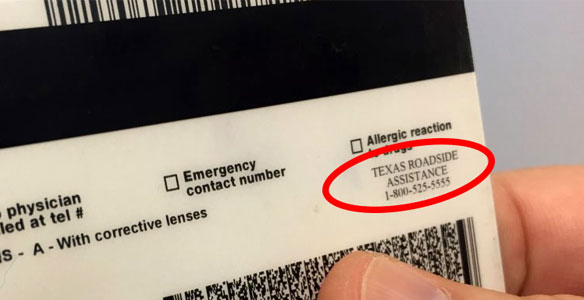Roadside Assistance in Texas – Is It Free?

Being stranded on the road can be both frustrating and frightening. For those who live in the state of Texas, help is as close as your telephone.
In 1989, the Texas Department of Public Safety set up a hotline (1-800-525-5555) to help stranded motorists (on state and federal roads) obtain the help they require. The telephone number of the hotline is printed on all state driver’s licenses as well as Texas state ID cards. Many drivers don’t even know this toll-free phone number exists, and those who do are often misinformed about the services the provide.
Many people believe that this roadside assistance is offered to all Texas motorists for free. This is incorrect. Some of this confusion is related to an email that circulated in 2001 advising drivers that if they called the number on their license, the state would pay for the roadside service (including one gallon of gas). Again; NOT true.
Keep in mind that if you’re on a roadway managed by the North Texas Tollway Authority (NTTA) such as the Dallas North Tollway, Sam Rayburn Tollway, etc.), NTTA also offers similar roadside safety services via their hotline: 214-224-2203. The NTTA Roadside Safety Services (RSS) team operates 24 hours a day, 7 days a week, and offer several services free of charge, such as: changing flat tires, adding water to radiators, providing a gallon of gas when needed, jump-starting dead batteries, pushing/pulling vehicles out of the roadway, even some minor vehicle repairs. The RSS team will also wait with you if your vehicle is disabled.
How the Texas Roadside Assistance Hotline Works
The Hotline is manned by operators located at the DPS Austin Communications Center. These operators obtain the necessary information from drivers and relay the information to the appropriate police agency; they may also send a unit to check on the well-being of the motorist until help arrives, and can help facilitate other services (e.g. towing, locksmith, etc.) at the owner’s expense.
Help is dispatched to stranded motorists in the following manner:
- If the call comes from a motorist within city limits, the call is relayed to the local police department that has jurisdiction.
- If the call comes from a motorist in a rural area, the sheriff’s office having jurisdiction is notified of the call.
- If the call comes from a motorist who is in an area where a courtesy patrol is available, the operator will provide that number to the motorist.
- In the event other agencies are unwilling or unable to respond, the call is given to the nearest DPS communications facility.
Calling The Hotline
Some of the reasons a motorist may call the Hotline include the following:
- Car problems that have left the motorist stranded.
- Hazardous road conditions.
- An accident which left the vehicle disabled.
- Notification of intoxicated or dangerous drivers.
- Debris in the roadway.
- Notification of suspicious activity at a rest stop.
Motorists calling the Hotline should have the following information available:
- Name.
- Cell phone number.
- Description of the vehicle (whenever applicable).
- Location (it’s very helpful to use a mile marker).
While the Texas DPS wants more drivers to be aware of this resource, it is important for motorists to understand that the hotline is specifically for non-emergency situations. Anyone who is injured in a car accident or requires emergency assistance still needs to call 911.
Category: In Depth






